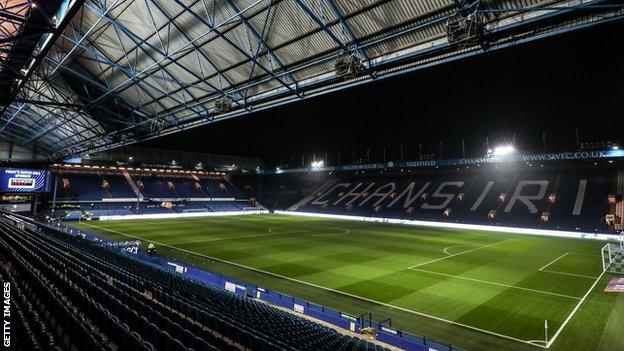Sheffield Wednesday say EFL acting 'unlawfully' over Hillsborough sale charge
- Published

Sheffield Wednesday spent the summer of 2018 under a transfer embargo
Sheffield Wednesday say the English Football League charge against them for selling their Hillsborough stadium to owner Dejphon Chansiri to try and avoid breaking spending rules is "unlawful".
The Owls sold their ground for about £60m, helping them record a pre-tax profit of £2.5m for 2017-18.
The misconduct charge relates to "how and when" it was sold and its early inclusion in the 2018 accounts.
"The club is accordingly bringing its own claim against the EFL," they said., external
An EFL spokesman said it would "clearly be inappropriate" to comment specifically on matters linked to their "comprehensive investigation".
"Other than to reiterate that, following the review of a large number of documents provided by the club - some of those seen for the first time - evidence came to light to justify multiple charges of misconduct," they added.
Wednesday - ninth in the Championship - have denied the charge, which will be considered by an independent disciplinary commission, and say they "stand ready" to bring a claim against the EFL to "obtain compensation for its conduct".
"The club has in its possession numerous emails, letters and other documents in which the EFL gave authorisation to the transaction, and on which authorisation the club understood it could rely," said a club statement.
"That authorisation gave rise in law to a legitimate expectation that the transaction would be accepted by the EFL, which is binding on the EFL.
"The EFL is acting in breach of that binding legitimate expectation by retrospectively treating as misconduct that which it had itself previously authorised, and this makes the charges themselves unlawful."
Wednesday were charged on 14 November, with the EFL saying there was "sufficient evidence to justify issuing" the charges after reviewing a "large number of documents" relating to the sale.
If found guilty, Wednesday face "any sanction" under EFL regulation 92.2, which range from a reprimand to a points deduction, financial penalty or possible expulsion from the league.
Why sell the stadium to club's owner?
Without the sale of the ground, Wednesday would have posted a pre-tax loss of £35.4m for the financial year covering the 2017-18 campaign.
That loss would have followed on from deficits of £9.8m and £20.8m in the previous two seasons.
Under the EFL's profitability and sustainability rules (previously known as financial fair play), Championship clubs are only allowed to lose £39m over three years.
So to avoid a heavy points deduction (for which the maximum penalty is 21 points) a substantial amount of money needed to be generated.
The Owls were not the first to sell their stadium in an effort to make a profit in recent seasons, Derby County, Aston Villa and Reading having also been scrutinised for similar transactions.
Last season, Birmingham City were deducted nine points by the EFL for breaching profitability and sustainability rules.